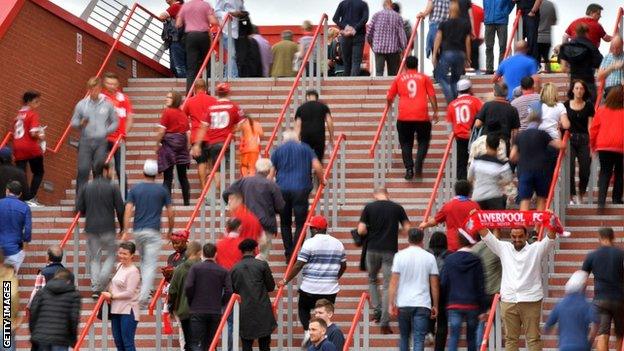Price of Football 2017: Young fans 'need more help' - Mark Hughes
- Published
- comments
Home ground v home comforts - how young fans watch football
Young fans need "more help" from clubs to be able to go to matches, says Stoke City boss Mark Hughes.
A BBC poll found that 82% of 18 to 24 year olds said the cost of tickets was an obstacle to them going to more games.
That's despite the BBC's Price of Football study revealing most ticket prices were frozen or reduced this season.
"It's probably an area that needs to be looked at," Hughes said.
Asked if clubs risked losing a generation of fans, he added: "Money is tight, everyone understands that. Maybe they need a little more help."
Hughes said many clubs place "high importance" on appealing to young supporters, citing Stoke's 'City 7s scheme' which sees the club work with seven year olds at 215 local schools.
On 18 to 24 year olds, he added: "It's only circumstances that are not allowing them to see as much football live as as everybody would like. You would like to think that at that stage they've got their team and they are emotionally involved."
What can I expect to get from my match-day experience? - The price of football
Arsenal manager Arsene Wenger agreed that it is tough for young fans to attend Premier League football.
"Can you afford to go when you are young? That is not always easy," he said.
"People's lifestyles are a bit different, they play less sport and play more on computers."
The BBC's annual study found 135 clubs out of 190 in England, Scotland and Wales offer reduced prices for teenagers and young adults - separate from any student concessions - but 55% of the fans polled said they had stopped going completely or go to fewer games because it was too expensive.
Young adult fans can save, on average, £146.94 on season tickets in the English Premier League and Football League, while in the top four divisions in Scotland the average saving on a season ticket is £143.66.
The Premier League said: "Clubs engage with their fans in many ways and hugely appreciate their loyal and passionate support.
"For young fans specifically, all clubs offer concession prices, including discounted junior season tickets."
An away game or save for a holiday?
Following the publication of the Price of Football study on Wednesday, hundreds of fans have shared their thoughts on the issue with BBC Sport.
Exeter City supporter Ryan Ward, 22, is one of the young fans who is struggling to keep up with modern prices: "Although I support a League Two side, I can often find it difficult to find the money to go to a game. Not only do you have the cost of a match ticket but you have the cost of travel, food and drink. It can quickly turn into a £40 or £50 day out."
Ryan Ward recommends the German model: "Another reason young people don't buy tickets is that you have to purchase a membership just to buy a ticket which can be roughly £25. Clubs need to follow Germany, where it is £20 a ticket, you can stand in the terrace, and pop up bars outside the ground are run by fans. The atmosphere is a lot better also."
Meanwhile, Chelsea fan Christopher Arkwright, 24, says that a football match isn't a "worthwhile investment" when you're saving for a house: "Me and my partner are trying to save up for a mortgage. How could I ever convince her that £70 to watch a game that usually I can watch at the pub for £10 (food and drink cost) is a worthwhile investment? And that's just the home games.
"I go to one away day near my birthday a year and the cost of it all is expensive," says Newcastle fan Rahul Kohli. "Including transport, you're looking at £100 or more. Most of my mates would rather go to a rave or save it for a holiday or festival and I cannot say I blame them."

Liverpool sell a ticket for £9 to 500 supporters with an L postcode for domestic matches
What about older fans?
It's not just young adults who feel they are being priced out of the game.
Stephen Hartley says that even with pensioner discounts, prices at football grounds can be "prohibitive", also pointing out that "several Premier clubs insist on a costly membership even before you are allowed to purchase a ticket for a game".
Sheffield Wednesday fan Mark Crossley says he has not been able to access pension discounts: "I took retirement from teaching at age 60. This meant a big drop in income. However, my club only gives discounts to over-65s and therefore I can't afford to attend. Other clubs give discounts to over-60s. I have proof I am a pensioner but the rigorous cut off of 65 is stopping SWFC having a devout follower attend."
Some older football fans, on the other hand, still feel very much included by their clubs.
Robert, a Celtic fan, takes his eight-year-old grandson to home games: "His season ticket costs £50 and it stays at that price until he's 15. My season ticket for a pensioner is £300. We get 21 home games for this. These prices make it very affordable for us and it's looking after the future support as the young ones grow up with the buzz of going to live games. Even for the League Cup final next week organised by the SFA, our tickets are £15 each, which is amazing."
Huddersfield Town fan and season ticket holder Stephen Ripley says that prices at the John Smith's stadium reflect the club's family values: "I have lived away from the town due to my career for over 40 years and it is the football that helps me retain the connection with where I was born. We are a family club and prices reflect this with a great spread of ages and genders attending matches."
A wider issue?
Many fans pointed to the challenging wider context of supporting their team.
Marcus in London argues that "prices of trains is the biggest issue" with attending live games, whilst Robert in Oxford says that the rising cost of living is the main reason he does not watch football anymore. He said: "I have a lot less disposable income and having to work 45-60 hours a week just to get by."
Ian agrees: "My 21-year-old son doesn't come to as many games as he and his friends can't afford it - mainly due to zero-hour contracts. Yes, football is out of reach for a lot of people, but it is part of a bigger problem of zero-hours contracts, rising rents/house prices and student fees/debt."
- Published16 November 2017

- Published15 November 2017

- Published15 November 2017

- Published14 November 2017
